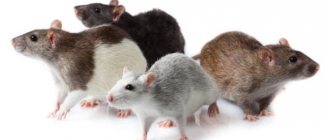Rats often choose country houses, food warehouses and other premises with food sources and unfavorable sanitary conditions as their habitat. The appearance of rodents near a person threatens not only spoiled things and food. If at least one individual is found in the house, the control process should immediately begin. Animals are distinguished by good survival and adaptability, high productivity, which allows them to quickly increase their population size.
Rats are carriers of pathogens of many dangerous diseases and infections. The fight against rodents begins with studying information about the characteristics of their life, reproduction, and physiology. The result of extermination measures will largely depend on knowledge of what rats are afraid of. In the fight against rodents, it is important to deprive animals of comfortable living conditions, cut off the path to a food source, and use preventive measures to prevent the reappearance of unwanted individuals. To do this, you should keep the room clean, avoid the accumulation of garbage and unwashed dishes, and do not leave food in the public domain.
The arsenal of modern means aimed at getting rid of rats is presented in a wide variety - these are folk remedies, repellent smells and sounds, various traps with glue and poisonous baits, chemicals, ultrasonic equipment. They differ in their effectiveness. The choice of a specific method should include an analysis of the situation and a preliminary assessment of the population size. The process of fighting rats is complicated by the rapid adaptation of rodents to new conditions and unfavorable factors.
Why are cats afraid of rats?
Several years ago, zoologists proposed using cats to fight rodents.
This idea is not new: in the provinces, housing services even send such instructions to residents. For example, in a standard 100-apartment Khrushchev house it is recommended to keep at least three cats. Cat owners are not entitled to benefits, only gratitude from the housing office. True, this year the cats let down the sanitary doctors: for some reason they refused to hunt rats. The doctors managed as best they could on their own, but they are already worried about the next season.
Zoopsychologist Natalya KRIVOLAPCHUK talks about how different biological species should coexist in a big city.
- So now cats won’t hunt rats? It's forever?
“It’s unlikely that we are dealing with any stable phenomenon when it comes to cats’ indifference to rats.” Most likely this is a one-time thing. Like why storks always stopped in one place, but now they chose another. Next year everything will be the same.
—Are other reasons possible?
—Cats will never hunt poisoned rats. And if this year they used some new poison against rodents, and not the standard zoocoumarin, then they could not help but feel it. And next year, when this poison is used, everything will happen again
- Do cats really hunt rats only because they regard them as food? Or just for the territory?
— Rats and cats are very different animals, they do not have any special objects for competition. Perhaps human scraps - but cats prefer to get food in a different way. They also don’t face the problem of how to divide housing in Yekaterinburg. If these two species had more reasons to compete, they would be similar in appearance. It seems to me that cats have ceased to be assistants in the fight against rats, because there are fewer of them themselves. They are not exterminated - but they make life in the city harder by closing basements, entrances and attics. But the city and people need animals, including the homeless. For this reason, by the way, you cannot try to domesticate all the dogs and cats walking around the city.
— Since ancient times, people and dogs have lived together, and if you remove dogs from society, people will transfer their functions to their neighbors, to their loved ones. They will kiss one, maul another, torture a third with commands, and expect commands from a fourth.
— What happens if cats never appear in the city?
“If you exterminate cats in a city, rats will come.” If there are dogs, foxes and wild boars will come, as was the case in Berlin
.
Source
The effectiveness of the repellent method
It’s worth saying right away that opinions differ regarding the effectiveness of the scaring method. There are those who support this method and talk about good results, but there are also those who say that it is completely ineffective.
But despite the controversial issues, for a long time people have been using a variety of aromatic herbs and remedies that can drive rats away from the territory.
In many ways, the effectiveness depends on the correct use of a particular product. You need to understand how the substance can affect the rodent and what results to expect.
Repellent substances are not capable of destroying pests; they are intended to make the animal feel uncomfortable and create the most unfavorable living conditions so that they want to leave the house.
What animals are rats afraid of?
Generally speaking, rats experience fear of a large number of factors - sounds, aromas, lack of food and poisons. When figuring out what animal rats are afraid of, the first thing that comes to mind is cats, and then humans (which also belongs to the animal world). In addition, rodents are afraid of dogs, other large animals and birds (geese, turkeys, guinea fowl), especially if they meet them for the first time.
However, in most cases, a cat and sometimes a dog are the most effective “repellents” of rats and mice from the house. The question of whether rats are afraid of cats may seem somewhat strange, since it is well known that cats are the natural enemies of rodents. In addition, mice and rats prefer to stay away from places where there are traces of felines.
Do pet rats smell?
Almost any pungent odor repels rats, since rodents’ sense of smell is better developed than other receptors. In addition to unpleasant aromas, you can influence rodents using sounds. Parasites do not like sharp and loud bangs or impacts. Nowadays you can buy devices that produce sounds that humans cannot hear.
Smells
Knowing what smell rats don’t like, you can use it to influence the animals. This method is one of the safest and most humane. At the same time, most products with the necessary aroma can always be found at hand. The main thing is to know how to use rat “aromatherapy” correctly.
Peppermint
Ledum
Another time-tested folk remedy is wild rosemary. The plant intoxicates rats and mice, so rodents try to avoid the grass. Ledum is suitable for use in the house, country house, garage
The plant is poisonous, so you need to work with it with caution
Elder
Hydrocyanic acid is a toxic substance that has a detrimental effect on rodents. It is contained in elderberry. Therefore, experienced gardeners often plant shrubs near fruit trees and other plantings. It is also effective to place elderberries near outbuildings
Use at home must be done with caution so that other animals and children do not have access to the plant.
Chamomile
The pleasant aroma of chamomile is unbearable for rats. Therefore, rodents try to immediately leave the home where there is the smell of a flower. Chamomile is used dry and fresh. It is safe for households and other animals. The product can be easily purchased at a pharmacy.
Sagebrush
Mint or lemon balm will help protect not only the supply of vegetables in the basement, but also the food stored in the cupboards at home. The grass is placed in bags and laid out in the required places. The aroma of mint has no negative effects on humans, but is unpleasant to mice. Rodents leave the area saturated with the smell of grass.
The pungent smell of tansy is unbearable for rats and mice. Parasites cannot tolerate tart aroma. Therefore, with the help of several inflorescences you can quickly and permanently repel rodents. To prevent the appearance of uninvited guests, it is recommended to periodically replace tansy with fresh specimens and place them in places where rodents have been spotted.
Pyrethrum
Pyrethrum is safe for humans. The aroma of the plant is well tolerated by other animals, but is unpleasant to rats. Pyrethrum foliage, stems and flowers are used. They must be placed in rodent habitats.
Blackroot
Essential oils
Essential oils have a high effect. They have a high concentration of odor, so the aroma remains in the air for a long time. To repel rats, you can use essential oils of mint, tea tree, tansy and wormwood.
Ultrasound
An effective way to repel mice is to use ultrasonic devices. Electronic repellers emit ultrasonic waves that rodents cannot tolerate. Advantages of repellers:
- safety;
- efficiency.
Flaws:
- high cost of devices;
- limited capabilities of the device if there is a large amount of furniture in the room.
Among the most popular and effective models are:
- "ElectroCat Turbo" - the effective impact area is about 400 square meters. m. A domestically produced device that costs 2,000–2,500 rubles rids a room of rodents in a matter of hours.
- “Pest Riddex” is an imported decorative device designed for an area of 200 square meters. m. The cost of the device is 1,600–2,000 rubles.
After turning off the device from the network, there is a possibility of rodents returning to the room.
You can scare away rats with harsher substances. Among the folk remedies you can find turpentine, kerosene, cologne, ashes from the skins of killed rats, etc. All substances are toxic and have a pungent odor. Therefore, the use of most products in an apartment or residential building is impossible.
In fact, domestic decorative rats are very clean animals that should not have a strong or unpleasant smell. If you smell it, it is because the cage or bedding has not been freshened for a long time. They are able to absorb the aromas of urine and feces, and then “smell” the entire apartment. The second common reason is illness. A sick animal always smells like infection.
What cats catch rats and mice?
For many people, cats have long become the embodiment of laziness and tranquility. However, these adorable animals can provide significant benefits. These are rat-catching cats that help free homes and surrounding areas from mouse or rat infestations.
Although all members of the cat family are predators, cats that catch mice and rats are not found everywhere. These rodent hunters are distinguished by well-developed muscles, strong bones, and dexterous paws. In addition, most of them have a tri-colored or striped coat (although not necessarily), which provides them with good camouflage.
This is interesting. In addition, in the question of which cats are better at catching mice and rats, the gender of the animal is also important. Ratcatcher cats are an incredible rarity; rodents are usually hunted by cats driven by maternal instinct, or more precisely, the need to protect and feed their offspring. When a cat catches rats, she will teach this skill to her kittens. So it is not recommended to separate them from their mother before 4–5 months of age if you want to get a rat catcher.
Rat "screams of terror"
Like some other animals, rats can be repelled by playing their own danger signals. This method is sometimes used to scare away birds and to control monkeys on tropical farms. Once a recorded cry of danger is enough to use it almost constantly and effectively.
It is also useful to read: Choosing an effective electronic rat and mouse repeller
However, some rules must be followed:
- The sound should not be played regularly so that the animals do not get used to it;
- The sound should be clearly audible throughout the room;
- The actual cries of danger must be recorded, and not just squeaks;
- Recording and reproducing equipment must capture the ultrasonic frequency range.
In domestic conditions, the implementation of this method will in most cases be ineffective. Firstly, using a smartphone or computer microphone to record rat squeals is not the best option, since the ultrasonic component will not be recorded at all (even vibrations above 15-17 kHz will be recorded with distortion). Secondly, reproduction will also require emitters (speakers) capable of reproducing ultrasonic vibrations without significant distortion. Well, and thirdly, few people would want to live in a house where a loud rat squeal is constantly suddenly heard.
The use of ultrasonic rat and mouse repellers in this regard would be more justified.
On a note
People know the harsh old-fashioned way of scaring away rats: they used to simply catch a live rat and nail it to the wall. While the animal was dying, its relatives heard the terrible screams of its agonizing fellow. However, for humane reasons, such a method should in no case be considered for practical implementation.
The Six Best Cat Breeds for Catching Rodents
So, what breeds of cats catch mice and rats? Some of the most common breeds distinguished by active hunting skills are:
- Persian - Persians have high intelligence, and the females of this breed actively get rid of mice, but often today representatives of this species are increasingly called “fur furniture”;
- Manx comes from the tiny isle of Man, located between England and Ireland. These cats are experienced hunters, once popular with sailors, who kept them on ships to fight ship rats;
- Chartreux (Carthusian cat) is a born hunter, they give up everything just to play with their prey, while being calm and docile the rest of the time;
- Maine Coons are one of the largest cats with beautiful fur and a luxurious tail, very effective hunters when developing their skills;
- Siamese are smooth-haired beauties with excellent reactions and an independent disposition, but their small size does not allow them to become an effective rat catcher, although Siamese are excellent at dealing with mice;
- Siberian cats are fairly large cats with thick fur that easily adapt to temperature changes. They are excellent hunters, easily coping with both mice and rats.
Traditional methods
Folk remedies have certain advantages: they are time-tested, do not require large financial costs and demonstrate excellent results. Such methods are often not humane, but they make it possible to deal with rodents.
It is necessary to pour a small amount of vegetable oil into a bottle with a large neck and twist the container so that the product spreads along the walls. Next, the bottle is placed at a slight slope. The neck should point up. The next morning you will find live mice in the container that were unable to get out through the slippery glass.
A bottle with oil spilled on the inside is an effective means of fighting mice
You need to pour half a bucket of water, placing a board with any delicacy in the middle. Next, the vessel is positioned so that pests can easily fall into it. Trying to reach the tasty morsel, the mice will drown.
You can purchase special glue and treat any surface with it, not forgetting the pieces of bait. When running over greased plywood or cardboard, pests will certainly stick. The only drawback is that the product dries quickly. It needs to be lubricated from time to time. The recommended layer thickness is 2-3 mm.
A solution of potassium permanganate in water will help remove the smell left behind by mice
Vinegar is no worse at neutralizing odors. It is a natural antiseptic that destroys toxic fumes and kills pathogens. 50 g of vinegar should be diluted in 0.5 liters of liquid. The solution is sprayed with a spray bottle or used to wash floors.
Do dogs eat rats?
An interesting question becomes whether dogs eat rats. Some dogs are quite successful at catching and killing rats. However, do they eat such prey? In some cases, yes. Especially if these are stray, homeless animals trying to get food for themselves in this way.
However, giving a pet that has caught a rat the opportunity to eat it is not a good idea. After all, the rat could have previously swallowed poison and be a source of helminths or infections that can be transmitted to the dog and negatively affect its health.
To cope with a rat infestation, you should not have pets, but it would be more effective to contact a pest control company. Its specialists will carefully treat any premises and areas.
How to use scents correctly
The result of the fight largely depends on correct application. Therefore, when using aromatic products you need to adhere to some rules:
- Substances must be placed in close proximity to the burrows. They are installed in small containers or applied to fabrics and cotton pads. Essential oils can be added to water and rinsed the floors, and corners can also be treated.
- To make dry plants and herbs smell longer, they need to be placed in small rag bags.
- Be sure to change fresh plants, since the aromas disappear very quickly, which means their effectiveness is lost.
- It is recommended to change aromatic substances from time to time, since rats have the ability to get used to them.
- In order for the result to be as positive as possible, you can use several products at the same time.
- You cannot use toxic products or those that can cause an allergic reaction in humans in residential areas.
- Use products with caution when there are pets in the house.
What animals eat rats?
In general, the question of which animals eat rats differs in two ways. The first is pets. Theoretically, domestic cats and dogs can eat rats (pythons, by the way, also happily eat small rats). However, should such nutrition be allowed? No. Wild rats can cause irreparable harm to your pet.
The second is forest animals living in natural conditions, for which mice and rats are one of the main sources of food. Thus, among forest animals that are distinguished by their tirelessness in exterminating rodents, species stand out that are united by the common name small mustelids. These include forest ferrets, weasels, stoats, and weasels. Ferrets eat rats if they can handle them while hunting, because mustelids are relatively small in size.
Source
Using the scents of natural enemies
It's no secret that rodents are afraid of cats, which are considered their main “thunderstorm.” However, this trend is more true for village cats than for pets living in comfortable apartments.
But should you be upset if your purr runs away in fear from one type of mouse, and you can’t rely on his hunting instincts? No, because you can drive out uninvited gray guests using the smell of a cat, or rather its urine. To do this, you can place used cat litter near the holes or soak rags with urine. Inhalation of ammonia vapor leads to a sharp decrease in the number of mouse offspring, causing the population to die out faster.
However, even more than cats, small rodents are afraid of snakes and rats. For the former, they act as natural food, while the latter fight with them for the same food sources and destroy their burrows. Therefore, mice can smell the excrement of their enemies a mile away and avoid them. You can easily become the owner of this “wealth” in any pet store.
Using these methods in an apartment is not very pleasant, but they are quite suitable for dachas, vegetable gardens and non-residential premises.
The psychology of predator and “prey”, or is friendship possible?
Under natural conditions, the purr hunts rodents, trying to protect its territory and the owner’s house from pests. But now many people keep decorative rats at home, which, unlike street rats, are very cute and funny. Like dogs or cats, there are a huge number of breeds of rats. And each is cute in its own way.
Many, having seen a photo of a cute rodent, strive to get one for themselves. Someone begins to study thematic literature, communicate on forums, look for good breeders of the breed they like in their own or a neighboring city. Others thoughtlessly buy the first rodent they come across, without even thinking that healthy pets are not always sold at poultry markets.
But today we’ll talk about how a cat and a decorative rat, which in natural conditions are at enmity, get along with each other. Will the rodent be worried by the presence of the purr, or will the cat be more afraid of the rat? How to make them friends with each other? And is it even worth getting a cute little eared dog if there is already a cat at home?
Folk recipes: herbs
How to get rid of mice using suitable plants? Some herbs are excellent repellents. Their use will help eliminate rodents and forget about their existence for a long time. These herbs include:
Windless autumn
- Autumn colchicum. The plant is poisonous and therefore has a detrimental effect on rodents. In order to prepare the bait, you need to take about 30 g of colchicum seeds, grind them to a powder, and then combine them with any cereal or flour. The mixture is thoroughly mixed and placed in the rooms where the animals have settled.
- Ledum. This plant acts as a mouse repeller. Its leaves contain a huge amount of essential oils with a powerful, even intoxicating aroma. Fresh grass is laid out near mouse holes. Rodents do not like the aroma of wild rosemary, so they prefer to stay away from it.
- Black elderberry. The bark and leaves of this plant emit a strong unpleasant odor that not only people, but also mice do not like. Elderberry branches are collected in small brooms and placed in rooms where rodents have settled.
- Blackroot. The smell of this plant is also unpleasant for animals. If the mice sense it, they will try to capitulate as soon as possible. Black root is used fresh. Bunches of grass are hung in the room closer to the floor.
- Chamomile and tansy. Mice do not like their smell, so they will never look into a home or cellar where there are bunches of such herbs. Chamomile and tansy placed around the perimeter of the house will help drive parasites out of the room.
The listed mice control agents are used not only in fresh, but also in dried form. To do this, the herbs are crushed and packaged into small rags, which are then tied in knots and laid out in the corners of the rooms and next to the minks.
How do cats and rats get along?
Much depends on the characters of the pets. If the cat, as usual, is calm and absolutely indifferent to any inhabitants of the house, then there should be no problems. She may be afraid of the rat, but only because she has never seen such a cute Mickey Mouse before. There will definitely be first interest. The cat will come up and sniff the cage with the rodent. And if the cat is really afraid, then she will no longer approach the cage. Even more so, he will simply stay as far away as possible.
If the cat is initially aggressive or comes from a family of rat catchers, then it is better to be insured. Such a purr will always be ready to attack and strangle the rodent. Here the owner needs to think: either not take the rat, or protect it from attacks by a predator (place the cage high, in a place inaccessible to the cat, and do not leave the animals alone even for a short period of time). There is no need to hope for chance. You will be responsible for both the baby and the cat. In any case, it will be stressful for both pets. For only one “duet” it will quickly end, the animals will become friends. And for another union, this stress will last as long as both animals live in the same territory.
However, you should not think that how a predator and a decorative rat will get along depends only on the character of the cat. Believe me, this cute rodent is far from defenseless. It is armed with tenacious paws with sharp claws and strong sharp teeth. And if someone encroaches on the territory or life of the baby, he will fight for them. And it won’t seem like enough.
There is a lot of useful and interesting information about decorative rats on the website https://ratmania.ru
There have been cases where domestic cats have become victims. Some rodents kept the purr at bay by fearlessly attacking them or bullying them (pulling their whiskers or fur, trying to bite their nose or paw if the cat got too close to the bars of the cage). And then the owners have to think about how to protect the cat from the attacks of the cutie-eared cat. But such bullies don't come across very often. And even if you have just such a fearless mischief-maker, this does not mean that he can be left alone with the cat. Yes, he will stand up for himself, but what can it cost him?
Much less often you come across cats that are afraid of everything, even their own shadow. And such pets will stay as far as possible from the cage with the rodent. You should not force animals to get to know each other or communicate with each other. This will be stressful for both. And don’t forget that a baby rat’s heart is very tiny; it’s already beating much faster than a cat’s. And because of fear, it will even flutter, which is very bad.
All about pet rats
Decorative rats do not need special care or special expensive food. They are well trained, love to communicate with their owner, frolic, and are very trusting of a loved one. This breed is distinguished by high intelligence, they are quite cunning.
There are many varieties of domestic rats
Note! Among the household members, the rat often has a favorite. During communication, they make funny faces, move their small ears, and are ticklish
Rodent behavior
Before you get such a pet, you should learn everything about pet rats. The domestic rodent is very inquisitive. If you let him walk freely around the apartment, he will explore every corner of it. Therefore, for safety reasons, it is better to remove all dangerous objects, collect wires and cables in a box, the rat can chew them. An animal in your arms may begin to grind its teeth or lick its fingers. This means that it loves its owner very much and thus shows its affection.
Rat is quite easy to tame
If the animal begins to squeal or squeak, it means that it is dissatisfied and indignant. A long sound may indicate that the pet is experiencing pain.
The most active time of day for a rat is night. At this time, she can play with rattles and rattle the feeder. In addition, it can make supplies from plastic pieces, sawdust, pieces of wood, and paper pieces, collecting them in the corner of the cage.
Note! Males can box, thus establishing which of them is dominant. Your pet can make a hole in the litter
Dimensions
Domestic rodents grow a little larger than their wild relatives. Being in comfortable conditions, without the need to get their own food, they often suffer from excess body weight. Almost all varieties have the same weight and size.
Adult boys weigh on average 500 g, but there are also individuals that gain up to 900 g. The weight of females varies from 250 to 500 g. The body length of animals reaches about 25 cm.
The small size of rodents makes them easy to keep
Do they stink or not?
A clean and healthy rat does not smell repulsive. However, to get rid of the unpleasant smell of the cage, you will have to try. It is better not to skimp on the litter, change it constantly, clean the cage weekly and disinfect it with special means. Do not leave pieces of food in the rodent's home.
How do you know if you can have a cat and a rat at the same time?
Many people try to make friends between the predator and the “prey” for the sake of beautiful photographs. But this is a huge risk. This is the equivalent of being placed next to a trained tiger. It's real Russian roulette here. Either everything will be fine, or you will be bitten, despite the trainer. In any case, the fear will still be there. So is it worth doing this to a rat? It’s one thing if the pets themselves reach out to each other and become interested. It’s another matter if you initiate this “friendship.”
In any case, think carefully in advance: are you ready for such responsibility? It's not easy to get yourself a new animal. You take responsibility for his life and health. Will you be able to provide him with a decent and peaceful life? Do you have a place in your house where your cat can't get to? Only this place for the cage should not be in a draft or in a cold/damp room.
In addition, think about how your cat will react to a new family member. You know her character, you have noticed how she reacts to guests or other animals. Is your pet jealous or is she ready to share you with the whole world.
Pets are not toys. It is extremely important to think about everything in advance, and not grab the first animal you like, drag it into the house, and then wonder whether the cat and rat will get along or not?
It’s another matter when you already have a rodent living with you, and you found/bought or were given a cat. It’s a little easier with a baby, although his curiosity and desire for games can injure a whiskered rodent. All contacts between animals will have to not only be controlled (so that the kitten does not play too much and harm it, or a frightened rat does not harm it), but also be dosed. Kittens are more fearless than adult cats. This is due to the fact that they are still exploring the world and everything is interesting and new to them. Although at the first meeting, almost all the little purring babies get scared, become an arch and try to jump away. Although then interest still takes over, and the kitten reaches out to smell and touch the stranger. In any case, these 2 cuties cannot be left without your control. Even if they are not afraid of each other and become friends from the first second, anything can happen. These are animals, and it is impossible to read their thoughts.
And remember, if a cat (or its relatives) belongs to the family of mousecatchers or rat-catchers, then it is better not to keep rodents at home. Genes will take their toll sooner or later.
Source
Light
Rats are nocturnal animals, and other things being equal, they prefer to be in dark places and go out in search of food at dusk and in the dark. However, they easily and quickly adapt to light, and if they do not encounter any dangers in illuminated places and in bright rooms, they quickly cease to be afraid of light. Often, rats become diurnal and forage in daylight.
This means that although in general rats are afraid of light, it will not be possible to use this as a permanent repellent. If you leave the light on in the room, then after a few days the animals will stop paying attention to it.
On a note
Interestingly, due to the specific nature of their vision, rats do not perceive infrared light. In zoos, this is used to switch nocturnal rodents to daytime mode: during the day a red light is on in the enclosure, and the animals believe that they are in the dark, and at night a regular incandescent lamp is turned on, and the rodents go to sleep. As a result, visitors during the day can observe animals that lead a nocturnal lifestyle.
What are cats and cats afraid of?
Cats are brave but cautious creatures. They react to any discomfort, noise, suspicious smell, and try to avoid danger. Such reinsurance saved their lives more than once. Some fears are justified, some are unfounded, but the cat owner must take them into account, find and eliminate the cause. In this article we will tell you what cats are afraid of and what to do about it.
Reviews
After destruction, it is important to find and dispose of all corpses
Sergey:
“There were rats in the warehouse, they didn’t let us live - they were arrogant, noisy, they gnawed everything they found. We tried more gentle means - they didn’t help, we threw away a couple of carcasses and that’s it. When we were looking for something to scare away rats, we found excellent reviews for the “Ratcatcher” and decided to try it: we mixed minced meat with gel, and to be safe, we also dripped it into the water. After the weekend, they immediately found about 15-20 corpses, in the corners - a dozen more, it’s good that they didn’t start to stink. Now we got a couple of cats, the rats haven’t returned yet.”
Daria:
“I used “Rat Death” when in the spring I discovered traces of the presence of rats at the dacha. The result is amazing: a week later, about 5 corpses were found outside the house, the rest seemed to have evaporated. Just in case, I installed an ultrasonic repeller. I haven’t seen a single rodent all summer, even the mole holes have disappeared.”
You can get rid of rats in your home using different methods: prepare a dangerous mixture, buy poison or a repeller, or set traps. But getting rid of pests does not end with elimination: it is important to properly dispose of the corpses. Dead rodents must be moved and burned or buried at a depth of at least 0.5 meters.
Basic fears of cats and kittens
Cats are predators, but they are not at the top of the food chain, so they can easily become prey. Pets know this and behave accordingly. They study the situation, sniff, listen. Having discovered danger, the cat is afraid and hides.
The main fear triggers for them are:
- loud noise;
- unpleasant or suspicious odor;
- other/new animals, especially dogs;
- new people, close contact with them;
- children.
Folk remedies whose repellent abilities are questionable
Folk art is replete with ideas and recipes for remedies that rats should supposedly avoid, but in practice this often does not happen.
Here are just the most famous of them:
- Vinegar - It is believed that rats are afraid of it due to its strong, unpleasant odor. Some even try to use vinegar essence, which is unsafe to use, for this purpose. At the same time, however, it is silent that not only rodents, but also the residents of the premises will have to inhale the aroma of vinegar;
- Essential oils and perfumes. It is highly doubtful that the animals that have conquered the whole world from India to the USA would shy away from the exquisite aromas of world-famous perfume houses or the smells of essential oils. Such means can alert them, but are not able to drive them out of the house;
- Bleach - Rats actually avoid places that smell too strongly of bleach (bleach releases small amounts of chlorine gas into the air, a very caustic, poisonous gas). However, the active use of bleach in an apartment or house is a dubious idea, since the residents themselves will have to inhale such an aroma. In addition, the duration of action of the product is short, since bleach quickly loses its activity in the air;
- Naphthalene - rats are not always afraid of it, and, moreover, this same product is recognized as a carcinogen and is prohibited for use in residential premises;
- Ash. The use of ash to repel rats is a typical folk myth, since it does not cause any fear or particular discomfort in rodents;
- Broken glass falling asleep in rodent passages is also a kind of unfounded legend;
- The smell of burnt rubber and burnt fur - such folk remedies may indeed frighten rats once, but they are not capable of becoming a reliable permanent means of fighting them;
- Turpentine, kerosene and gasoline - the same applies to them as to vinegar. And in addition, they are also fire hazardous;
- Burdock thorns, which supposedly frighten animals by clinging to their fur. Actually ineffective;
- Tobacco or cigarettes - despite their strong smell, they practically do not repel rodents.
On a note
In general, rats are not afraid of water (moisture) and cold. They feel great in damp basements, can swim for a long time (in nature they are known to catch ducklings and frogs in the water), and can easily tolerate the cold if they have access to food sources. Situations have been described in which rats lived for several generations in freezers at an air temperature of -18°C, breeding inside frozen pork carcasses. Therefore, airing a house or apartment in winter will not help get rid of rats.
Interesting video: how to remove rodents that are not affected by poison and are afraid of public utilities
What are cats afraid of at home?
Fear in a cat can be caused by working equipment - a hair dryer, shaving machine, blender, drill. A particularly strong reaction to a vacuum cleaner. This is a very noisy unit associated with danger. When pets hear a hum, their survival instinct is triggered, which explains why cats are afraid of the vacuum cleaner.
Other pet irritants include:
- new people;
- children;
- bathing in the bathroom;
- suspicious sounds;
- some odors;
- complete darkness.
Why are cats afraid of humans?
Fear of people is more common in wild cats that live on the street and have little contact with humans. If an animal is naturally dominant, it may be aggressive towards people. When he has a compliant disposition, he will simply run away from them.
Domestic cats may run away from a person if they have had a negative experience with each other. This can be either a consequence of abuse or simply an unpleasant contact (for example, vaccination at the veterinarian). If the cat avoids hands, it may have been beaten, or does not like the touch of strangers.
Fear may be a reaction to a new person who:
- is too noisy;
- smells unpleasant to the cat;
- I accidentally hurt my pet.
The cat at home is afraid of the child, if he is too active, constantly climbs on her, suppresses her. Do not allow children to pester pets when the animals do not want it. Fear can develop into serious behavioral and health problems.
Sounds that scare a cat
Cats are very sensitive to noise, so if they were isolated as children from the everyday sounds of people and animals, there will be fear. They will react especially strongly to loud, fast, sharp sounds.
What sounds are cats afraid of?
- fireworks, salutes;
- thunder;
- noise from equipment (vacuum cleaner, lawn mower, motorcycle, drill, etc.);
- growls;
- loud bang, bang;
- whistling;
- doorbell;
- sirens.
Cats can react to high-frequency sounds from appliances that we don't hear, don't pay attention to, or don't even know are making a sound. The list includes computer monitors, televisions, fluorescent lamps and even remote controls.
Cats may be wary of hissing. It is a territorial, defensive, attack sound made by another cat. Of course, this is very alarming for the pet; he is looking for the source. If he doesn’t find it, he prefers to leave.
What to use for non-residential premises?
Rodents often breed in closets or garages where food products are not available. For these purposes, you should take into account what smell mice are afraid of. Unpleasant odors and poisonous plants can be used in non-residential premises. Rodents dislike such “odors” as:
- Burnt rubber.
- Burnt fur or fluff.
- Kerosene.
- Cheap perfume products.
- Naphthalene.
They are unacceptable for residential properties. But if the room is rarely visited, then these products will perfectly repel rodents. If you do not want to use chemicals and burn unpleasant-smelling objects, then you should use poisonous plants.
What smell are mice afraid of, considering the flora? The aroma of elderberry and wild rosemary will be frightening for parasites. Such plants are not suitable for indoors. Hydrocyanic acid, which is found in elderberries, as well as essential oils of wild rosemary are dangerous for humans and animals.
Another smell of what herb are mice afraid of? Black root is dangerous for rodents. It should not be used indoors, as it releases dangerous alkaloids. Mice sense poison well and therefore avoid it.
All procedures necessary to control mice must be carried out in accordance with safety regulations. You need to use gloves, a respirator, and preferably a gas mask
It is important to carry out processing promptly so as not to come into contact with harmful components for a long period. Doors and windows in the room must be tightly closed
You should not visit it until everything has cleared up.
Why are cats afraid of water?
Cats are not so much afraid as they do not like water. It makes their fur wet and heavy, making the animal vulnerable to other predators. They especially do not like to get under cold water due to the sudden change in temperature.
Another reason cats don’t like water is the smell, especially when it comes to an outdoor pond. They can be put off by the smell of chemicals that they consider toxic. Therefore, a cat’s refusal to drink water that you pour for him is a reason to be wary and check the quality of the liquid.
Using the contents of the kitchen cabinet
If you don’t have a cat and don’t want to spend money on purchasing plant extracts, ordinary spices available in the arsenal of any housewife will help. The smell will help save supplies from the invasion of gray guests:
- carnations;
- coriander or cilantro;
- red pepper;
- sage;
It is allowed to use powder or seeds of these seasonings. Dry sage leaves, which are best burned, are also suitable. The strong aroma of coffee will also help repel rodents; freshly roasted beans work best.
Also, pests do not like the scent of vinegar, which can be poured into small containers and placed around the room. Although this option is more suitable for protecting cottages from rodents in the winter, since constantly inhaling a pungent odor is not only unpleasant, but also unsafe. The aroma of bleach scattered in the corners is also suitable for the same purpose.
Cats and other animals
Cats can be afraid of both strong (dogs) and weak (mice) animals. They may also be afraid of their equals - other cats.
Why are cats afraid of dogs?
Cats have every reason to fear dogs because they are larger than cats and smell like predators. Many dogs instinctively chase moving objects, especially those that are smaller than them. Even dogs that have lived with cats since childhood can attack a cat. They don’t touch their own people, but they don’t touch strangers easily.
Cats see the predator's gaze, smell it and run away. Some cats under stress are capable of attacking a dog. This can be fatal, especially if the cat attacks a bull terrier, shepherd or other large dog.
Cats are afraid of mice
Fear of rats and mice is not uncommon. The reason is simple - rodents bite. When the prey begins to resist and hurts, the cat understands that the hunt must be approached with caution and a realistic assessment of the enemy’s strength. Some cats refuse to hunt rats and mice altogether.
The cat is afraid of the new cat
If your pet did not grow up with other cats, it will be wary of them due to a lack of communication skills. A stronger and more confident cat will send a signal: “Stay away from me.” Your pet takes the warning into account and moves away from contact.
Smell of essential oil
In addition to the herbs themselves, fresh or dry, it is recommended to use essential oils to expel rats from premises. Their concentration is much higher, so such products will remain on the surface for a long time after treatment. There are several ways to use essential oils. You can drop a couple of drops onto a napkin or a piece of material and place it in the corners of rooms and in places where pests are located. The second way is to add essential oil to the water before starting cleaning.
Both floors and furniture should be washed. But you should not use too much product. It is very concentrated, and then there is a chance that you yourself will not be able to be in the room.
The third way is to drop essential oil on a candle and light it. Then the aroma will gradually spread throughout the room and penetrate into all the cracks. Instead of a candle, many people use a night light. Because due to the evaporation of essential oil from it, a persistent characteristic amber will be in the air. To purchase essential oil you will need to allocate money, but it is more convenient to use than plants. Odor from rodents in vegetable gardens and garden plots
You can really protect your territory if you plant daffodils in the flowerbed together with other flowers. The aromas of those plants that are used to expel rats from premises will also help.
For example, elderberry planted near warehouses, grain barns, and sheds will prevent the appearance of animals. Its branches have long been used to layer haystacks and tie the trunks of apple trees. Buildings around which red elderberry grows are often free of rats and mice. Blackroot herb is also used. It is recommended to plant it closer to fruit trees and shrubs, as well as the barn and your own home. For a plot of land measuring 6 acres you will need about 20 - 25 plants. Wormwood planted around the perimeter of the garden will provide excellent protection against pests. Its strong bitter-tart aroma is unpleasant to rodents. Thickets of field or wild mint are also often planted around houses.
To protect your property from attacks by rats, you can simply place recently picked herbs of wormwood, tansy, and chamomile near the trees and around the cellar. For example, tansy smells like camphor. In addition to rats, its aroma is unpleasant for flies, moths, bedbugs, and fleas. The presence of unpleasant herbal odors usually confuses rats. They are not able to stay in such conditions for a long time, so they are forced to leave your territory.
How to recognize fear in a pet
When a cat is afraid, he reacts like this:
- runs away;
- hiding;
- shows aggression;
- freezes in place;
- cries (meows pitifully);
- lick themselves too actively;
- curl up into a ball, pretending to be asleep.
If he doesn't like the smell (eg aerosol/perfume with citrus scent), he may shit in the wrong place, including. into the owner's slippers. Your task is to correctly understand the signals of what the cat is most afraid of, find and eliminate the irritant.
Russian blue cat
This is a real aristocrat among rat catchers. Russian blue cats were kept at court by many royals, for example, Peter I and Catherine II. Centuries later, these graceful, smooth-haired animals remain excellent hunters. They can handle not only mice, but also rats weighing up to 0.5 kg!
It is worth noting that Russian Blue cats do not get along well with representatives of other breeds, but get along well with their own. Like many other predators, they are not particularly susceptible to affection, but at the same time they treat people with sympathy and rarely show aggression.
Please note - a lazy, barely mobile cat cannot become a good rat catcher.
Sedatives for cats
If the cat has a lot of phobias, talk to a veterinarian who will advise how to prevent the cat from being afraid and prescribe sedatives. They contain herbs that have a sedative effect on pets, relieve tension and fear (extracts of valerian, catnip, motherwort, hops). They are usually released in the form of capsules or solution.
Drugs can enhance the effect of tranquilizers, antipsychotics and anticonvulsants. But before combining them with other medications, be sure to ask your doctor. The drops have an attractive aroma for cats, so they should be stored in an inaccessible place.
Buy cat sedatives only from certified pet stores. It is dangerous to take medicines at the market, since you can buy a counterfeit or expired product, which will negatively affect the health of your pet.
Source
Tips and tricks
Rats are afraid of many odors that humans cannot smell or perceive differently. Therefore, people have been using aromatic substances to repel rodents for a long time. Over the centuries, it has been discovered that the use of herbs, perfumes and fuel can quickly get rid of rodents.
But it is better to take preventive measures and prevent the spread of pests:
- Bags of dried mint should be placed in food cupboards.
- It is recommended to scatter blackroot seeds over the baseboards.
- You can protect the harvest by covering it with elderberry branches.
- It is worth hanging several juniper branches in the cellars.
Rats have a highly developed sense of smell and hearing. To scare away the animal, it is enough to choose a suitable grass with an unpleasant odor, or install an ultrasonic device in the room. People use many products that can be used in residential buildings. It is better to decide which method to choose experimentally.
Why “aromatherapy”?
Because it is a cheap, accessible, humane and safe way to get rid of rodents. Whichever other method you choose, you will have to face certain difficulties.
For example, the use of chemicals, despite their high efficiency, is not always possible. If there are children, allergy sufferers or pets in the apartment, the use of poisons can result in tragedy. In addition, this method, like the use of mousetraps, forces one to deal with the need to dispose of corpses, which is extremely unpleasant. Add to this the deadly smell if the rodent that has eaten the chemicals manages to hide securely before dying.
As for the ultrasonic device, it is not affordable for everyone. In addition, it works over a certain area, so on a large scale it requires knowledge of approximate mouse routes.
Against this background, phytoprotection recipes are an excellent alternative to getting rid of uninvited guests. Aromas that mice do not like cause the latter to hastily leave the premises and prevent them from repopulating.
Cymric
These are medium-sized cats, also without a tail. They have long, tenacious legs that allow them to catch up with prey and grab it with a death grip. They have a strong skeleton with athletically developed muscles. Cymrics are sociable and active, and it is very important for them to spend a lot of time outdoors. It is not worth keeping such a mobile animal in an apartment - during games it will destroy everything around. Experienced breeders recommend keeping these cats in country houses.
Mint against mice
The safe and even pleasant scent of mint can be an excellent solution when you need to repel mice. This plant can be used fresh, as a tincture or essential oil.
Regardless of the chosen method of application, the effectiveness is not lost.
Peppermint
One of the most effective plants against rodents is peppermint. Freshly picked mint leaves are laid out around the perimeter of the room.
Some also practice using the dried plant. Place the mint in bags and hang it around the house near vent holes or other places where a rodent is likely to get into.
Peppermint tincture
Some housewives also actively use peppermint tincture to treat the room. They dilute it with water (1:1) and place it in a spray bottle.
They use this mint spray to treat cabinets and surfaces where rodents are most often found.
Peppermint oil
If there are a lot of mice, some try to create an aura of a persistent mint smell using essential oil. Drop mint oil into the aroma lamp and light the candle.
The aroma, pleasant to humans and unpleasant to mice, will hang in the air for a long time. And the second option is to drip 2-3 drops of oil onto a piece of cotton wool and place them in different corners of the room.
Plague bacteria in cats
Some rodents carry plague, an infection caused by the bacteria Yersinia pestis. 4 These are essentially the same bacteria that caused the infamous “Black Plague” of the Middle Ages. Plague is often spread by fleas, but cats can become infected by eating the meat of infected animals (often small mammals).
Cats infected with Yersinia pestis may experience lethargy, depression, loss of appetite, vomiting, diarrhea, cough, muscle soreness, and fever. The cat may develop swollen lymph nodes, lesions in the mouth, and weight loss.
Treatment includes the use of antibiotics and supportive care. The sooner treatment can be started, the higher the chances of survival.
People rarely become infected with the plague. When they do become infected, it is usually through a flea bite. Symptoms and treatment are relatively similar to those in cats.
A little white kitten was eaten by rats tonight
They reached the corner of the fence and began jumping onto a high platform near the house, like a back porch, but without stairs, without the ability to go down to the street. The two climbed up and ran into the corner, into the darkness, they probably had some kind of hole or house there. And the little white claw scratches along the wall, climbs up to the middle and plummets back down, cannot climb! I ran to save him, otherwise he would fall behind his family and get lost! I wanted to throw him upstairs. I approached him, and he hissed and ran into the trash heap, under the trash cans. Not tame, afraid. It's scary to crawl under the trash can, it's dark and there are rats. The friend says: “Let’s move away, now my mother will come to the rescue.” And sure enough, the kitten “meow meow” pitifully a couple of times and the mother, father and another cat came running, which I suspected was the mother’s mother, that is, the mother-in-law. They walked around him, caressed him and went upstairs too! Apparently they can’t jump up with a kitten in their teeth. I started talking ks-ks-ks, lured the kitten out, but he didn’t come. He just cries. But it’s still scary to go under the trash heap, because it’s dark and the rats haven’t gone anywhere! I stood there on all fours for about fifteen minutes, looked and we went home. And a friend said that the kitten would be eaten by rats. I felt very sorry for him. But between my own finger being bitten off by rats and a small white kitten being eaten, I chose the kitten. A friend also sacrificed a kitten for the safety of his five. Like me, he is afraid of rats. It’s terrible, I now have to live with this somehow. On the other hand, if his mother even abandoned him, why am I so worried. But still horror-horror!
Source
Characteristics of rat-catching cats
There are several basic signs that allow you to determine how good a rodent hunter a cat will be. Among them:
- head shape (felinologists have found that the best rat catchers are animals whose skull outlines resemble a triangle);
- muscular body with strong paws;
- protruding ears with tassels;
- bushy mustache;
- powerful jaw;
- variegated, usually three-color coloring (helps with camouflage);
- short hair (in wet weather, long hair emits a stronger odor that rodents can smell from afar).
But cats eating rats or simply catching them, obeying instinct, is unlikely to affect the hunter’s talent. Character is also not a decisive factor - rat catchers can be affectionate and playful, or they can behave with restraint and even sternness. But of course, a good hunter must be brave and decisive, because a cornered rat can even attack a cat.
Situations have been recorded where a rat killed a cat by grabbing its throat. True, such situations occur extremely rarely; more often the rodent tries to escape.











